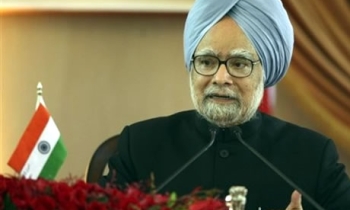LONDON: When David Blunkett resigned recently from the cabinet of Prime Minister Tony Blair, for the second time in less than a year, he did not have to wait long for new employment. Within weeks he re-emerged as a columnist at The Sun, the best-selling newspaper in Britain.
For The Sun, a tabloid that thrives on scandals like those that brought down Blunkett when he was home secretary and, later, the work and pensions secretary, the hiring was a way to bolster its firepower for the latest battle raging on Fleet Street: The War of the Columnists.
In one of the most hotly contested newspaper markets in the world, with nearly a dozen national papers fighting for readers and advertisers, opinion writers have become the not-so-secret weapon. Papers like The Sun, The Times, The Guardian and The Daily Telegraph are poaching high-profile columnists away from each other with lucrative pay packages. Meanwhile, columnists are also being courted by a new public relations firm specializing in relations with opinion writers.
Commentators are proliferating in the news, features and business sections of British papers and even popping up on Page One. Like the "shock jocks" of American radio airwaves, they hold forth on everything from Iraq to sports to sex changes.
"We're in a period in which newspapers are declining everywhere in the West," said Roy Greenslade, a commentator on the newspaper industry at The Daily Telegraph. "In Britain, columnists are seen as a way to respond to that."
The stature of columnists seems to have risen elsewhere, too. The New York Times recently started charging users of its Web site for access to its columnists, for instance. But in Britain, where national newspapers are louder, brasher and more numerous than their American and Continental counterparts, the emphasis on writers who can brandish pens like swords seems particularly great.
In an era in which most people get their news from television or the Internet, Greenslade said, many British newspapers have decided that their best hope for survival lies in analyzing or commenting on the news in order to appear fresh the next morning. One newspaper, The Independent, has said it is turning itself into a "viewspaper" - with plenty of columnists and cover stories that stake out strong positions.
With the demand for recognized names rising, Greenslade this autumn left The Guardian, where he was a longtime columnist, to join The Telegraph.
For its part, The Guardian this year hired away Simon Jenkins, a political columnist, from The Times of London (though he still writes a column in The Sunday Times). Soon after, The Times countered by poaching David Aaronovitch, another political commentator, from The Guardian and its sister Sunday paper, The Observer.
Elsewhere, The Daily Mail lured Richard Littlejohn, a political commentator, away from The Sun. Simon Heffer, another political writer, left The Mail to join The Daily Telegraph. And previously, The Guardian lost a brash writer on social issues, Julie Burchill, to The Times, while The Times hired Gerard Baker, a Washington-based columnist, away from The Financial Times.
Perhaps not surprisingly, the game of musical chairs is driving up pay rates. Littlejohn reportedly will be paid around £500,000, or $877,000, a year by The Mail, which did not return calls seeking confirmation. William Hague, the former Conservative Party leader, has been paid about £200,000 annually for his weekly musings in The News of the World, though he has said he will quit writing to return more actively to politics.
Meanwhile, big names like Matthew Parris at The Times, Yasmin Alibhai-Brown at the Independent and Polly Toynbee at The Guardian, are seeing their own stock rise right where they are.
Escalating pay scales, editors say, risk eliminating another benefit of the columnist. Their work, particularly when on a contract basis, often costs less than news reporters.
Will the latest investments pay off?
"Names sell newspapers, there's no doubt about it," said Andrew Gowers, who recently was dismissed from his job as editor of The Financial Times, after which he started writing a column - if only briefly - for another paper, The Evening Standard. "If you know that on a certain day, a certain columnist is holding forth on a certain topic, that can sell a few papers."
The current British obsession with celebrity, which plays out in lurid detail each morning in the tabloids, plays a role in this, Greenslade said. Readers remember columnists' boldface bylines and mug shots, while other writers are quickly forgotten.
But there may be limits to these writers' powers of attraction. Market research shows that few readers follow a favorite columnist when he or she switches newspapers, Greenslade said.
Nonetheless, some columns are seen as vitally important in maintaining readers' loyalty. Lynda Lee-Potter was known as the "first lady of Fleet Street" for a longtime Daily Mail column in which she blended politics, personality and parenting through the sensible prism of Middle England. When she died in October 2004, it took the paper a year to name a replacement, prompting tireless speculation about its intentions.
Given the British columnists' typical disdain for ambiguity - one of Littlejohn's last columns for The Sun was headlined, "I'd rather eat my own toenail clippings than vote for Blair" - it might seem futile to try to influence them.
Yet that is exactly what Julia Hobsbawm, a well-connected public relations operative, intends to do. Along with several partners, she recently started a public relations firm that aims to link clients, which include companies, charities and government bodies, with editorial writers and columnists - avoiding news reporters entirely.
For an initial fee of £2,500, rising to £5,000 in January, clients of Hobsbawm's firm, Editorial Intelligence, get a quarterly magazine and access to online profiles of 1,000 British political, business and media columnists and editors.
Unusually, Hobsbawm has also recruited a number of high-profile British journalists to join an advisory board for Editorial Intelligence.
Though they get no compensation for this, they will be invited to events with the firm's clients, she said, and could be asked to do consulting work for them if they so choose.









